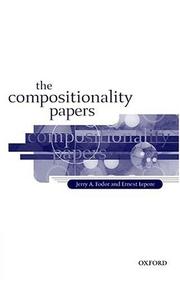| Listing 1 - 3 of 3 |
Sort by
|

ISBN: 0199252165 0199252157 9780199252169 9780199252152 Year: 2002 Publisher: Oxford: Clarendon,
Abstract | Keywords | Export | Availability | Bookmark
 Loading...
Loading...Choose an application
- Reference Manager
- EndNote
- RefWorks (Direct export to RefWorks)
Philosophy of language --- Language and languages --- Compositionality (Linguistics) --- Langage et langues --- Compositionnalité (Linguistique) --- Philosophy. --- Philosophie --- 800.1 --- Taalfilosofie --- 800.1 Taalfilosofie --- Compositionnalité (Linguistique) --- Philosophy --- Language and languages - Philosophy.
Book
ISBN: 9781402083105 9781402083099 1402083092 1402083106 904817838X 9786611875954 1281875953 Year: 2009 Volume: 85 Publisher: [Dordrecht] Springer
Abstract | Keywords | Export | Availability | Bookmark
 Loading...
Loading...Choose an application
- Reference Manager
- EndNote
- RefWorks (Direct export to RefWorks)
Are natural languages genuinely compositional? What roles does context play in linguistic communication, and by what means? In particular, does context interfere with the compositional determination of truth conditions? What meanings should theorists assign to sentences if compositionality is to be retained? These are the central questions of this important volume of new philosophical essays in honour of Ernie Lepore.
Lexicology. Semantics --- Philosophy of language --- Linguistics --- semantiek --- linguïstiek --- taalfilosofie --- Compositionality (Linguistics) --- Context (Linguistics) --- Semantics --- Compositionnalité (Linguistique) --- Contexte --- Sémantique --- LePore, Ernest, --- EPUB-LIV-FT LIVHUMAI SPRINGER-B --- Compositionality (Linguistics). --- Context (Linguistics). --- Linguistics. --- Language and languages—Philosophy. --- Semantics. --- Linguistics, general. --- Philosophy of Language. --- Theoretical Linguistics. --- Linguistic science --- Science of language --- Language and languages --- Formal semantics --- Semasiology --- Semiology (Semantics) --- Comparative linguistics --- Information theory --- Lexicology --- Meaning (Psychology)
Book
ISBN: 9789400721081 9789400721074 9400721072 9400721080 Year: 2011 Publisher: Dordrecht [etc.] Springer
Abstract | Keywords | Export | Availability | Bookmark
 Loading...
Loading...Choose an application
- Reference Manager
- EndNote
- RefWorks (Direct export to RefWorks)
This book argues that languages are composed of sets of ‘signs’, rather than ‘strings’. This notion, first posited by de Saussure in the early 20th century, has for decades been neglected by linguists, particularly following Chomsky’s heavy critiques of the 1950s. Yet since the emergence of formal semantics in the 1970s, the issue of compositionality has gained traction in the theoretical debate, becoming a selling point for linguistic theories. Yet the concept of ‘compositionality’ itself remains ill-defined, an issue this book addresses. Positioning compositionality as a cornerstone in linguistic theory, it argues that, contrary to widely held beliefs, there exist non-compositional languages, which shows that the concept of compositionality has empirical content. The author asserts that the existence of syntactic structure can flow from the fact that a compositional grammar cannot be delivered without prior agreement on the syntactic structure of the constituents.
Mathematical logic --- Logic --- Lexicology. Semantics --- Philosophy of language --- semantiek --- taalfilosofie --- wiskunde --- logica --- Compositionality (Linguistics) --- Compositionnalité (Linguistique) --- EPUB-LIV-FT LIVHUMAI LIVLANGU SPRINGER-B --- Compositionality (Linguistics). --- Linguistic analysis (Linguistics). --- Language and languages --- Philosophy. --- Semantics. --- Logic. --- Mathematical logic. --- Language and languages—Philosophy. --- Mathematical Logic and Formal Languages. --- Philosophy of Language. --- Algebra of logic --- Logic, Universal --- Symbolic and mathematical logic --- Symbolic logic --- Mathematics --- Algebra, Abstract --- Metamathematics --- Set theory --- Syllogism --- Argumentation --- Deduction (Logic) --- Deductive logic --- Dialectic (Logic) --- Logic, Deductive --- Intellect --- Philosophy --- Psychology --- Science --- Reasoning --- Thought and thinking --- Formal semantics --- Semasiology --- Semiology (Semantics) --- Comparative linguistics --- Information theory --- Lexicology --- Meaning (Psychology) --- Methodology --- Translating and interpreting.
| Listing 1 - 3 of 3 |
Sort by
|

 Search
Search Feedback
Feedback About UniCat
About UniCat  Help
Help News
News